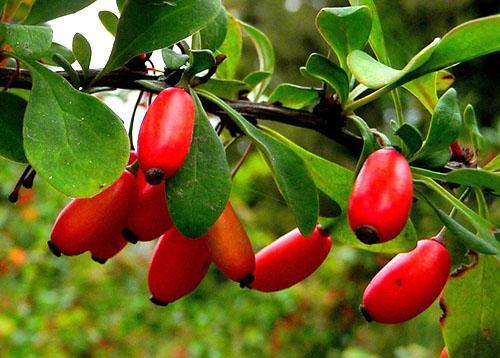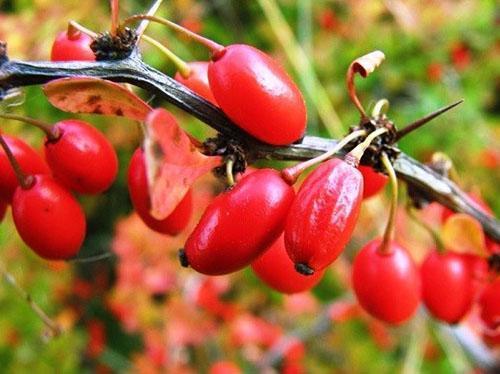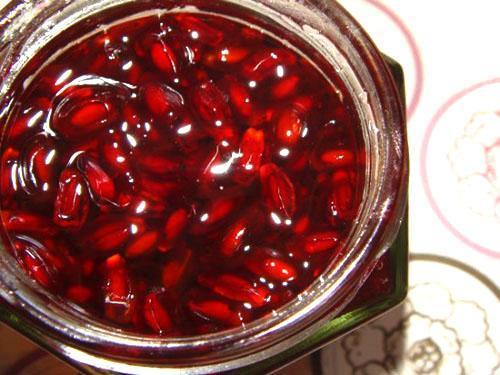Useful properties and contraindications for the use of barberry
 Barberry is a unique plant that has found wide application not only among the inhabitants of Russia. It is used both for decorative purposes, instead of hedges, and in folk medicine. Due to its unique medicinal properties and contraindications, barberry deserves a place of honor among medicinal herbs.
Barberry is a unique plant that has found wide application not only among the inhabitants of Russia. It is used both for decorative purposes, instead of hedges, and in folk medicine. Due to its unique medicinal properties and contraindications, barberry deserves a place of honor among medicinal herbs.
In the vastness of a vast country, only three varieties are more often found:
- common barberry;
- Ottawa barberry;
- barberry Thunberg.
Common barberry is popular with healers and traditional healers, which is used not only to treat many diseases, but even in cooking. The whole shrub has healing properties, but more often the choice falls on the berries of the barberry, root, leaves.
Barberry berries - medicinal properties

It is strictly forbidden to pick green fruits - they are poisonous!
Ripe bush fruits are a storehouse of nutrients. Despite the fact that they have a pronounced sour taste, they are used in the preparation of various compotes, syrups, jelly, jams, sweets, jellies and even liqueur. In cooking, a sour taste, adds piquancy to meat and vegetables. Oriental cultures are especially fond of this product, which season lamb and rice dishes with barberry spices.
The berries contain various substances:
- acids: malic, citric, tartaric;
- carotenoids;
- pectin and tannins;
- vitamins C, E;
- carbohydrates;
- macro- and microelements.
Decoctions of barberry berries improve appetite, perfectly strengthen and stimulate the body's immune system. They are used for treatment in folk medicine for liver diseases, hypertension, inflammatory processes, colds. Also, the decoction restores the vitamin balance in the body (prevention against vitamin deficiency), treats cancer.
 A properly prepared tea made from barberry berries increases efficiency, improves health and mood. It is recommended to be consumed daily by people living in an environmentally polluted environment - the broth (or tea) perfectly removes toxins and harmful substances from the body. That is why you can talk a lot about the benefits of barberry berries. Harm can only be if there is an individual intolerance to the fetus or an allergic reaction to it.
A properly prepared tea made from barberry berries increases efficiency, improves health and mood. It is recommended to be consumed daily by people living in an environmentally polluted environment - the broth (or tea) perfectly removes toxins and harmful substances from the body. That is why you can talk a lot about the benefits of barberry berries. Harm can only be if there is an individual intolerance to the fetus or an allergic reaction to it.
Decoctions and drugs from barberry during pregnancy, lactation, postpartum and monthly bleeding, the presence of cirrhosis of the liver, gallstone disease are contraindicated.
Barberry for diet
Now you know how barberry berries are useful. But there is another property of fruits that is used in various diets. Due to the low calorie content and richness of vitamins, a special tea is brewed from the berries to replenish the body's vitamin reserves. During the diet, a person loses a large amount of minerals, and only barberry tea is able to replenish them.
Tea recipe... It will take 1 tsp. barberry fruits (dry). Pour boiling water over them and let it brew for 10-20 minutes. Drink this tea three times a day throughout the course of the diet.
Cooking berries for different occasions
Decoction recipe. Pour one teaspoon of berries with a glass of boiling water and boil over low heat. The boiling time should not exceed 15 minutes. After the broth must be filtered and used for treatment.
Such a recipe, depending on the dose taken, is used to treat hemorrhoids, stomach ulcers, problems with the duodenum, and is also taken as a mild laxative.
Wine tincture recipe... For cooking, you need a liter of red wine (preferably home-made), 200 g of barberry berries (pre-grind) and 200 g of sugar. The berries are mixed with wine and left for a month to infuse, shake occasionally. After 30 days, add sugar to the strained tincture. Take no more than 50 g before meals.
 This remedy perfectly cleanses the blood, enriches it with vitamins, promotes the outflow of bile and improves immunity.
This remedy perfectly cleanses the blood, enriches it with vitamins, promotes the outflow of bile and improves immunity.
Overdose can lead to nausea, vomiting, dizziness. In this case, it is recommended to stop taking the tincture until complete recovery.
Barberry root - its properties and treatment
 One of the components of the shrub, which is also effectively used in folk medicine, is the root of the barberry. Medicinal properties are not inferior to berries and are also used to treat many diseases. Harvesting of the root is carried out in the event that the bush is to be uprooted or transplanted.
One of the components of the shrub, which is also effectively used in folk medicine, is the root of the barberry. Medicinal properties are not inferior to berries and are also used to treat many diseases. Harvesting of the root is carried out in the event that the bush is to be uprooted or transplanted.
Barberry root has the following properties:
- anti-inflammatory;
- antipyretic;
- antispasmodic;
- diuretic;
- promotes the outflow of bile;
- lowers blood pressure;
- improves the functioning of the heart and liver.
Root treatment
 Barberry root has found its application in the treatment of female diseases. A decoction for douching, special trays is prepared from it. The effectiveness of the treatment of diseases of the oral cavity and gums is also high - a decoction from the root is used to rinse the mouth. With the combined treatment, its leaves and berries are added to the root of the barberry, various infusions, rubbing, compresses and decoctions are prepared. They treat various kinds of wounds, eye diseases, eczema, arthritis, radiculitis, rheumatism, osteochondrosis, any spasms of the arms and legs. It is also an effective anti-inflammatory and pain reliever.
Barberry root has found its application in the treatment of female diseases. A decoction for douching, special trays is prepared from it. The effectiveness of the treatment of diseases of the oral cavity and gums is also high - a decoction from the root is used to rinse the mouth. With the combined treatment, its leaves and berries are added to the root of the barberry, various infusions, rubbing, compresses and decoctions are prepared. They treat various kinds of wounds, eye diseases, eczema, arthritis, radiculitis, rheumatism, osteochondrosis, any spasms of the arms and legs. It is also an effective anti-inflammatory and pain reliever.
 The recipe for a decoction of barberry root is simple. This will require 2 tbsp. pour spoons of the root with boiling water (about 0.5 l) and boil over low heat for 3-5 minutes. Let it brew for 40-50 minutes and then strain. This broth is used only externally for compresses or lotions. For rinsing the mouth and douching, it is recommended to dilute the resulting broth with water in a ratio of 1: 2. Do not swallow it as it is bad for the stomach.
The recipe for a decoction of barberry root is simple. This will require 2 tbsp. pour spoons of the root with boiling water (about 0.5 l) and boil over low heat for 3-5 minutes. Let it brew for 40-50 minutes and then strain. This broth is used only externally for compresses or lotions. For rinsing the mouth and douching, it is recommended to dilute the resulting broth with water in a ratio of 1: 2. Do not swallow it as it is bad for the stomach.
To prepare the root tincture, take 1 tsp. raw materials and fill with two glasses of boiled water, leave for 20-30 minutes. You can take 50 g three times a day before meals, depending on the course of treatment.
A contraindication for using the medicinal properties of barberry root can be: age less than 12 years, individual intolerance, pregnancy, breastfeeding, gastritis, liver cirrhosis.
How to use dried barberry
 Useful properties of dried barberry do not differ from fresh preparations. Therefore, dried berries, root, leaves can also be used to prepare infusions, decoctions, etc. - the value and amount of medicinal properties does not decrease.
Useful properties of dried barberry do not differ from fresh preparations. Therefore, dried berries, root, leaves can also be used to prepare infusions, decoctions, etc. - the value and amount of medicinal properties does not decrease.
 The main thing is to always remember that non-compliance with the dosage can cause side effects: loss of appetite, nausea, vomiting, etc. Therefore, before using, consult your doctor and take care of your health.
The main thing is to always remember that non-compliance with the dosage can cause side effects: loss of appetite, nausea, vomiting, etc. Therefore, before using, consult your doctor and take care of your health.